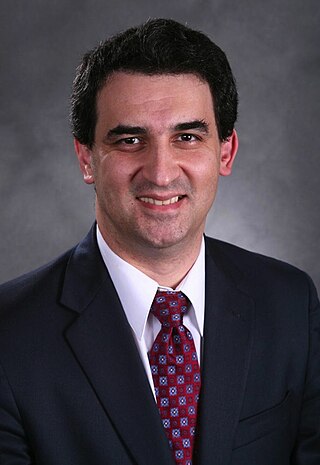Related Research Articles

Neurology is the branch of medicine dealing with the diagnosis and treatment of all categories of conditions and disease involving the nervous system, which comprises the brain, the spinal cord and the peripheral nerves. Neurological practice relies heavily on the field of neuroscience, the scientific study of the nervous system.

Urology, also known as genitourinary surgery, is the branch of medicine that focuses on surgical and medical diseases of the urinary-tract system and the reproductive organs. Organs under the domain of urology include the kidneys, adrenal glands, ureters, urinary bladder, urethra, and the male reproductive organs.

The Institute of Psychiatry, Psychology and Neuroscience (IoPPN) is a research institution dedicated to discovering what causes mental illness and diseases of the brain. In addition, its aim is to help identify new treatments for them and ways to prevent them in the first place. The IoPPN is a faculty of King's College London, England, previously known as the Institute of Psychiatry (IoP).

The University of Pittsburgh School of Medicine is a medical school of the University of Pittsburgh, located in Pittsburgh, Pennsylvania. The School of Medicine, also known as Pitt Med, is consistently ranked as a "Top Medical School" by U.S. News & World Report in both research and primary care. It was ranked 13th in the category of research and 14th in primary care by U.S. News for 2020 and is separately ranked 17th in the Academic Ranking of World Universities list of best medical schools in the world. The school encompasses both a medical program, offering the doctor of medicine, and graduate programs, offering doctor of philosophy and master's degrees in several areas of biomedical science, clinical research, medical education, and medical informatics.

Sree Chitra Tirunal Institute for Medical Sciences & Technology (SCTIMST), Trivandrum, is an Institution of National Importance established by an Act of Parliament in 1980. It is under the aegis of Department of Science and Technology, Government of India, with an Institute Body and a Governing Body constituted as per the provisions of the Sree Chitra Tirunal Institute for Medical Sciences & Technology, Trivandrum, Act, 1980. The Institute presents a unique model by connecting the different strands of Biomedical Technology ,Clinical Medicine and Public Health to produce a seamless continuum of indisputable relevance to society.

The American Academy of Neurology (AAN) is a professional society representing over 40,000 neurologists and neuroscientists. As a medical specialty society it was established in 1948 by A.B. Baker of the University of Minnesota to advance the art and science of neurology, and thereby promote the best possible care for patients with neurological disorders. It is based in Minneapolis, Minnesota, with a health policy office in Washington, DC.

Kenneth M. Heilman is an American behavioral neurologist He is considered one of the fathers of modern-day behavioral neurology.
The International Society for Bipolar Disorders (ISBD) is a nonprofit organization based in Pittsburgh, Pennsylvania, where it was founded June 17, 1999. The society focuses on research and education in bipolar disorders.
Orla Hardiman is an Irish consultant neurologist. She was appointed Professor of Neurology by Trinity College University of Dublin in 2014, where she heads the Academic Unit of Neurology, housed in Trinity Biomedical Sciences Institute. She is a HRB Clinician Scientist and Consultant Neurologist at the National Neuroscience Center of Ireland at Beaumont Hospital, Dublin. She leads a team of 30 researchers focussing on clinical and translational aspects of amyotrophic lateral sclerosis and related neurodegenerations. Hardiman has become a prominent advocate for neurological patients in Ireland, and for patients within the Irish health system generally. She is co-Founder of the Neurological Alliance of Ireland, and Doctors Alliance for Better Public Healthcare. In the past, she established the bi-annual Diaspora Meeting, a forum for Irish neurologists based overseas to present and discuss their research findings with neurologists working in Ireland.
The Joseph L. Mailman School of Public Health is the public health graduate school of Columbia University. Located on the Columbia University Medical Center campus in the Washington Heights neighborhood of Manhattan, New York City, the school is recognized by the Council on Education for Public Health.
David Charles is an American neurologist, professor and vice-chair of neurology, and the medical director of Telehealth at Vanderbilt University Medical Center.
The Mischer Neuroscience Institute is a combined research and education effort between the Vivian L. Smith Department of Neurosurgery and the Department of Neurology at McGovern Medical School at UTHealth Houston and Memorial Hermann Hospital. Located in Houston, the Institute draws patients from around the world for specialized treatment of diseases of the brain and spine. It was the first center in Texas and one of only a few institutions in the country to fully integrate neurology, neurosurgery, neuroradiology, neuro-oncology, spine surgery, pain medicine and neurorehabilitation.

Reading Hospital is a 738-bed non-profit teaching hospital located in West Reading, Pennsylvania. The hospital was established in 1867 and is a part of Tower Health System.

Sandro Galea is a physician, epidemiologist, and author. He is the Robert A. Knox professor and dean at the Boston University School of Public Health. He is the former Chair of Epidemiology at the Columbia University Mailman School of Public Health. Prior to his academic career in public health, Dr. Galea practiced emergency medicine in Canada and served in Somalia with Doctors Without Borders. He was named one of TIME magazine's epidemiology innovators in 2006 and Thomson Reuters listed him as one of the “World's Most Influential Scientific Minds” for the social sciences in 2015. Dr. Galea is past-president of the Society for Epidemiologic Research and an elected member of the American Epidemiological Society. He was elected to the National Academy of Medicine in 2012 and chaired two of the IOM's most recent reports on mental health in the military. Dr. Galea serves frequently on advisory groups to national and international organizations. He formerly served as chair of the New York City Department of Health and Mental Hygiene's Community Services Board and as member of its Health Board. Galea's scholarship has been at the intersection of social and psychiatric epidemiology, with a focus on the behavioral health consequences of trauma, including those caused by firearms. He has published more than 800 scientific journal articles, 50 chapters, and 13 books, and his research has been featured extensively in current periodicals and newspapers. His latest book, Pained, was published by Oxford University Press in March 2020. Galea trained as a physician at the University of Toronto. He went on to earn a master's degree in public health at Harvard T.H. Chan School of Public Health and a DrPH at Columbia University Mailman School of Public Health.

Vikram Harshad Patel FMedSci is an Indian psychiatrist and researcher best known for his work on child development and mental disability in low-resource settings. He is the Co-Founder and former Director of the Centre for Global Mental Health at the London School of Hygiene and Tropical Medicine (LSHTM), Co-Director of the Centre for Control of Chronic Conditions at the Public Health Foundation of India, and the Co-Founder of Sangath, an Indian NGO dedicated to research in the areas of child development, adolescent health and mental health. Since 2016 he has been Pershing Professor of Global Health and Social Medicine at the Department of Global Health and Social Medicine of Harvard Medical School in Boston. He was awarded a Wellcome Trust Principal Research Fellowship in 2015. In April 2015, he was listed as one of the world's 100 most influential people by TIME magazine.

Joel Salinas is an American-born Nicaraguan neurologist, writer, and researcher, who is currently an Assistant Professor of Neurology at Harvard Medical School. He practices general neurology, with subspecialty in behavioral neurology and neuropsychiatry, at the Massachusetts General Hospital in Boston, Massachusetts. He is also a clinician-scientist at the Harvard T.H. Chan School of Public Health and the Framingham Study at the Boston University School of Medicine.

Kathleen Ries Merikangas is the Chief of the Genetic Epidemiology Research Branch in the Intramural Research Program at the National Institute of Mental Health (NIMH) and an adjunct professor of epidemiology at the Johns Hopkins Bloomberg School of Public Health. She has published more than 300 papers, and is best known for her work in adolescent mental disorders.

Konstantin Slavin is a Professor and Head of the Department of Stereotactic and functional neurosurgery at the University of Illinois College of Medicine. He is a former president of the American Society for Stereotactic and functional neurosurgery and current vice-president of the World Society for Stereotactic and Functional Neurosurgery. His specialties include Aneurysm, Brain surgery, Brain Tumor, Cerebrovascular Disorders, Craniotomy, Dystonia, Essential Tremor, Facial Nerve Pain, Facial Pain, Glioblastoma, Headache disorders, Laminectomy, Lower back pain, Movement Disorders, Multiple Sclerosis, Neck Pain, Neurosurgery, Neurosurgical Procedures, Pain, Parkinson Disease, Spinal Cord Injuries, and Stroke.
Merit Cudkowicz is an American neurologist and neuroscientist who studies amyotrophic lateral sclerosis (ALS). Cudkowicz is Julieanne Dorn Professor of Neurology at Harvard Medical School, director of the ALS clinic and the Neurological Clinical Research Institute at Massachusetts General Hospital (MGH) and chair of the Department of Neurology at MGH. Cudkowicz has led several large scale collaborations and clinical trials to test novel treatments for ALS and as of 2020 researches ways to detect early biomarkers of ALS to improve diagnosis.
Erika F. Augustine is an Associate Professor of Neurology and Pediatrics at the University of Rochester Medical Center in Rochester, New York. Augustine co-directs the University of Rochester Batten Center, and is the associate director of both the Center for Health and Technology and the Udall Center of Excellence in Parkinson's Disease Research. Augustine's clinical research and medical practice specialize in pediatric movement disorders. She leads clinical trials for Batten diseases, a group of rare pediatric neurodegenerative disorders, and she has developed a novel telemedicine model to increase the efficacy of remote care for patients with rare diseases.
References
- ↑ "Neuroepidemiology | Karger Journal".
{{cite journal}}: Cite journal requires|journal=(help) - ↑ "1st International Congress on Clinical Neurology and Epidemiology, Abstracts" . Retrieved 2021-11-12.
- ↑ University of Pittsburgh Graduate School of Public Health Epidemiology Department
- ↑ "Faculty Research | Epidemiology | Pitt Public Health | University of Pittsburgh". www.publichealth.pitt.edu. Retrieved 2022-01-27.
- ↑ Archived 2012-12-21 at the Wayback Machine Columbia University Mailman School of Public Health Neuroepidemiology Training Program
- ↑ "University of Maryland School of Medicine Neuroepidmeiology Training Program". Archived from the original on 2012-11-12. Retrieved 2012-10-22.
- ↑ University of Illinois College of Medicine Department of Neurology and Rehabilitation Fellowship in Neuroepidemiology
- ↑ "Michigan State University International Neurologic & Psychiatric Epidemiology Program Neuroepidemiology Fellowship". Archived from the original on 2013-04-04. Retrieved 2012-10-22.
- ↑ University of Pittsburgh Graduate School of Public Health e-Brain research group
- ↑ "conceptual model" (PDF). Archived from the original (PDF) on 2013-07-19. Retrieved 2012-10-22.
- ↑ Harvard University School of Public Health Neuroepidemiology Research Group
- ↑ University of California, San Francisco Neuroepidemiology Research Group
- ↑ National Institute of Environmental Health Sciences
- ↑ "Kaiser Permanente". Archived from the original on 2012-03-09. Retrieved 2012-10-22.
- ↑ American Academy of Neurology Career Paths in Neuroepidemiology
